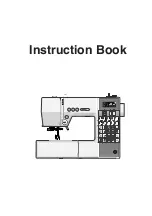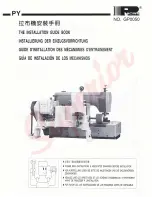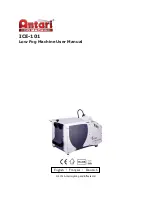
Troubleshooting
61
A
P
P
ENDI
X
4
Bobbin thread breaks.
Bobbin is set incorrectly.
14
Bobbin thread is incorrectly wound.
12
A scratched bobbin is being used.
14
Thread is tangled.
57
A bobbin designed specifically for this machine is
not used.
12
Fabric puckers.
There is a mistake in the upper or bobbin
threading.
12, 15
Spool of thread is set incorrectly.
12
Using improper needle or thread for the selected
fabric.
19
Needle is turned, bent or the point is dull.
20
Stitches are too long when sewing thin fabrics.
27
Thread tension is set incorrectly.
27, 56
Wrong presser foot was used.
21
The stitch is not sewn correctly.
The presser foot that is used is not appropriate
for the type of stitch that you wish to sew.
21
The thread tension is incorrect.
27, 56
The thread is tangled, for example, in the bobbin
case.
57
Feed dogs are set in the down position.
• Slide the feed dog position switch to the right
(
).
5, 46
Skipped stitches
Machine is threaded incorrectly.
12, 15
Using improper needle or thread for the selected
fabric.
19
Needle is turned, bent or the point is dull.
20
Needle is installed incorrectly.
20
Dust or lint has collected under the needle plate.
53
Thin or stretch fabrics are being sewn.
• Sew with non-woven water soluble stabilizer
under the fabric.
31
Symptom, Cause/solution
Reference
Not stitching
Needle is turned, bent or the point is dull.
20
Bobbin is set incorrectly.
14
Upper threading is incorrect.
15
High-pitched sound while sewing
Dust or lint is caught in the feed dogs.
53
Pieces of thread are caught in the race.
53
Upper threading is incorrect.
15
A bobbin designed specifically for this machine is
not used.
12
There are needle holes or friction scratches in the
bobbin case.
*
Fabric does not feed through the machine.
Feed dogs are set in the down position.
• Slide the feed dog position switch to the right
(
).
5
Stitches are too close together.
27
Wrong presser foot was used.
21
Needle is turned, bent or the point is dull.
20
Thread is entangled.
57
Zigzag foot “J” is slanted on a thick seam at the
beginning of stitching.
30
The fabric feeds in the opposite direction.
The feed mechanism is damaged.
*
The needle contacts the needle plate.
The needle clamp screw is loose.
20
Needle is turned, bent or the point is dull.
20
Fabric being sewn with the machine cannot be
removed.
Thread is tangled below the needle plate.
57
Symptom, Cause/solution
Reference






































